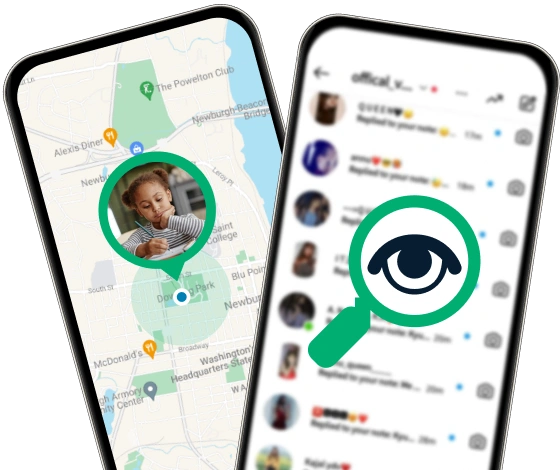Every VPN has been programmed with an Internet Protocol (IP) address distinct from the gadget’s own, giving kids access to evade any barriers implanted by parents to prohibit their minors from accessing specific content. Thus, a straightforward answer to the question, “Does VPN block parental control?” is, yes, it does!
What Does a VPN Hide from Parents?
VPN installation has been identified to break the barrier against teenagers’ exploration of desired erotic information. It creates an avenue to allow them access to inappropriate and some parental guidance content. Kids are talented as they can restrict pop-up blockers or clear cache that might be retained in their search history due to their tech-savvy nature.
It has been observed that 7th out of every ten teens conceal their online character. The following are ways by which they have hidden items from their parents:
- Erase search history
- Archive messages
- Set up privacy to hide sensitive contents
- Adopt incognito browsing mode
Therefore, if you need further evidence to answer the question, “Does VPN block parental controls?”, you just found the answers. VPN makes it possible for kids to hide the sites and information they access on their smart devices from their parents.
What Is a VPN?
VPN signifies Virtual Private Network. A VPN serves as a tool that aids the protection of one’s online privacy. Moreover, it justifies the essence of stabilizing a secured connection through a temporary network.
A VPN gives you access to bind to a server located offshore. Humans have discovered it to be a secured channel through which online identity from restrictions to a specific website or Internet protocol address can be circumvented.
wever, it has deprived some children of adequate access to quality articles for completing their term papers. The adoption of VPN has laid the bedrock to go beyond borders to get information.
Why Should I Care If My Child Uses a VPN?
Many parents keep asking, “Does VPN block parental controls?” and want to know why they need to care for their child using a VPN.
It is correct that the adoption of VPNs protects one’s web search history and location address, but that does not certify that the device is free from getting infected with a virus.
Hence, parents might keep antivirus software at bay to quarantine the hardware when it has malware or spyware viruses.
A VPN serves as web software covering your child’s true identity – name and location from Internet fraudsters and marketing agencies who might scoop their information and start sending broadcast messages.
The decision as to whether a child needs to use a VPN depends on evaluating whether the resulting benefits supersede its shortcoming. The gains range from enjoying a safe online experience, securing keyloggers’ information, and ensuring that educational content streaming remains private.
On the other hand, since VPN might hinder you from tracking your child’s sites, it makes it more challenging to know if your child is already accessing inappropriate websites.
This makes it an important reason you should be on the lookout for how your kids intend to use a VPN. In addition, you may want to take a step further to learn how to block child from using VPN.
Use Parental Control Apps to Protect Your Child Online
Parental control represents software developed to help parents caution the extent to which their children, mostly under 18 years, are exposed to insensitive or nonproductive content displayed on social media. For example, such displayed content might be promoting hate speech, religious bias, cultural superiority, erotic images, vague conversations, advertising the patterns of consuming hard drugs, disrespecting elders’ advice, etc.
VPN parental control tools have inbuilt features that either allow listing or blacklisting devices. For example, contents capable of misleading a minor child are classified as a blacklisting item, while that capable of educating the child is termed whitelisting.
Hence, there is a free view without restriction on the whitelist, while the latter, even when left unblocked, won’t function as it has been termed as a blacklisted category. Some software programs also allow for the activation of a child lock menu. This software limits the access of a child to narrow channels.
Available measures of controlling your child’s online activity include screen timing and content filtering, as some sites can manage and track our browsing preferences.
Sites that start with HTTPS have a secure connection path, and to some extent, the site is not easily compromised or hacked, unlike an area that does not attach an ‘s’ to the back of HTTP.
With regard to the above, parental control VPN apps are essential to help protect your child online.
What Types of Parental Controls Are There?
Now that you have an answer to the question, “Does VPN block parental controls?”, it doesn’t mean you shouldn’t protect your child’s device. Hence, among the types of parental controls that can be adopted includes uMobix, Cocospy, SpyBubble Pro, and Hoverwatch.
uMobix
It is a phone tracking app that can help safeguard your child’s device. It is modeled with a unique tracking system that allows parents to monitor the activities performed by teenagers on their devices.
The tracking features spy on every activity carried out by a person on the smartphone. The case is about the app being configured. It has a robust capacity to watchdog over 25 installed inbuilt and downloaded apps. The app keeps detailed historical records of calls, messages, files, locations visited, keyword searches, duplicate copies of deleted info, and records real-time events as they occur. If you wish to know how to get around uMobix app, you can read more on that.
Cocospy
It is another tracking software used to track devices remotely without prior knowledge of the target individual.
All that Cocospy requires to operate is to install the app on both the target phone and the principal phone, sign in your details on both devices with the same info you inputted during signup, and hide the app from displaying on the target’s smartphone.
The attributes encircled in Cocospy include stealth mode, call tracking via mobile phone IMEI and SIM info, social media spy, media file tracking, messages spying, location tracking, and browser history tailing.
SpyBubble Pro
Unlike other monitoring software, it runs within a stealth mode cloud-based method by creating an avenue for events to be documented in a secured path that can be accessed via any Internet-enabled channel.
The SpyBubble Pro gateway is password encrypted, which gives the user an assuring tone that their files are secured. It has the same features as the tracking partners above, including uninterrupted customer support and a prior installation guide.
Hoverwatch
It copies call details. The software can equally be programmed to capture all previous software surveillance suites. It reports the location of the monitored device each time an event happens, like playing music, receiving or placing a call, browsing the web, etc.
In addition, Hoverwatch can capture multiple facial representations via the front camera each time the camera stays in active mode.
How Does a VPN Bypass Parental Controls?
The question, “Does VPN bypass parental controls?”, has been well answered, but what is the principle behind the bypass?
VPN creates a gateway through which one can navigate sites that cannot be publicly visited in one’s territory.
VPNs can break out of parental control when their IP address that could reveal your online presence is hidden, and the connection is redirected.
Software developers have created versions of VPNs designed to misinform or not give verified info about a child’s mobile activity. This makes the teen’s parental restrictions void. Usage of VPN by minors will raise the barriers authorized to the effective functioning of an intelligent device by their parents as most kids love the habit of devising methods to navigate the webspace without boundaries.
Conclusion
You must have gotten a detailed answer to “Does VPN block parental controls?” VPN software has been proven to increase network bandwidth and hide one’s identity, evading parental controls.
VPNs are designed to make one exert excess control over limits placed on an Internet service provider subscriber against exploring areas of their interest.
Irrespective of the parental controls that might be installed, we are in a digital age where teens’ thinking levels rise exponentially, even beyond the technologies we are currently adopting. Hence, it boils down that you have to sit and talk to your wards about why you feel they shouldn’t be involved in whatever activity is capable of affecting their mental well-being, which is why you are guarding them.
It’s advisable to have a heart-to-heart talk with your children and make them realize their security is of utmost importance to you; you have taken such measures rather than allowing them to find out what might then breach their trust in you.
It should be noted that there isn’t 100% assurance on whatever benefits might be posed by installing VPN.
To some extent, an individual’s activity might be detected if they signed up for a social media and email account; the person has kept it active on the device for a long time without signing out.
The most secure approach is to surf the Internet using incognito mode, as this keeps you logged off from all accounts you have signed in.
To avoid getting tracked online is to refrain from Internet-related tools.
FAQ
You can start a conversation with the child and appeal to check their gadget after that. For example, to see what topic drives traffic on their social media handle and their view for a particular day and use the opportunity to look out if the VPN icon is installed on their device.
Since you've gotten suitable answers to the question "Does VPN block parental controls?", you should know how to prevent your child from downloading a VPN app. Thus, it would be best if you educated the kids on the risks associated with installing VPNs on their smartphones and other gadgets. Also, check if they have already been established. Finally, kindly delete and force the app to uninstall from their storage device, and monitor to confirm on some periods to ensure they are not defaulting to your advice.
Yes, VPN hides the browsing session search history. It creates an avenue for users to browse the Internet privately with an invisible identity.

Latest posts
- 10 Best Apps for Parents to Monitor Social Media: 2026 Guide
- Complete List of Keywords to Block for Parental Control
- Does Telegram Notify Screenshots? Everything About Screenshot Detection
- How to Find Someone’s Deleted Instagram Posts: Complete Guide
- Family Tracking App by uMobix: Keep Loved Ones Safe




